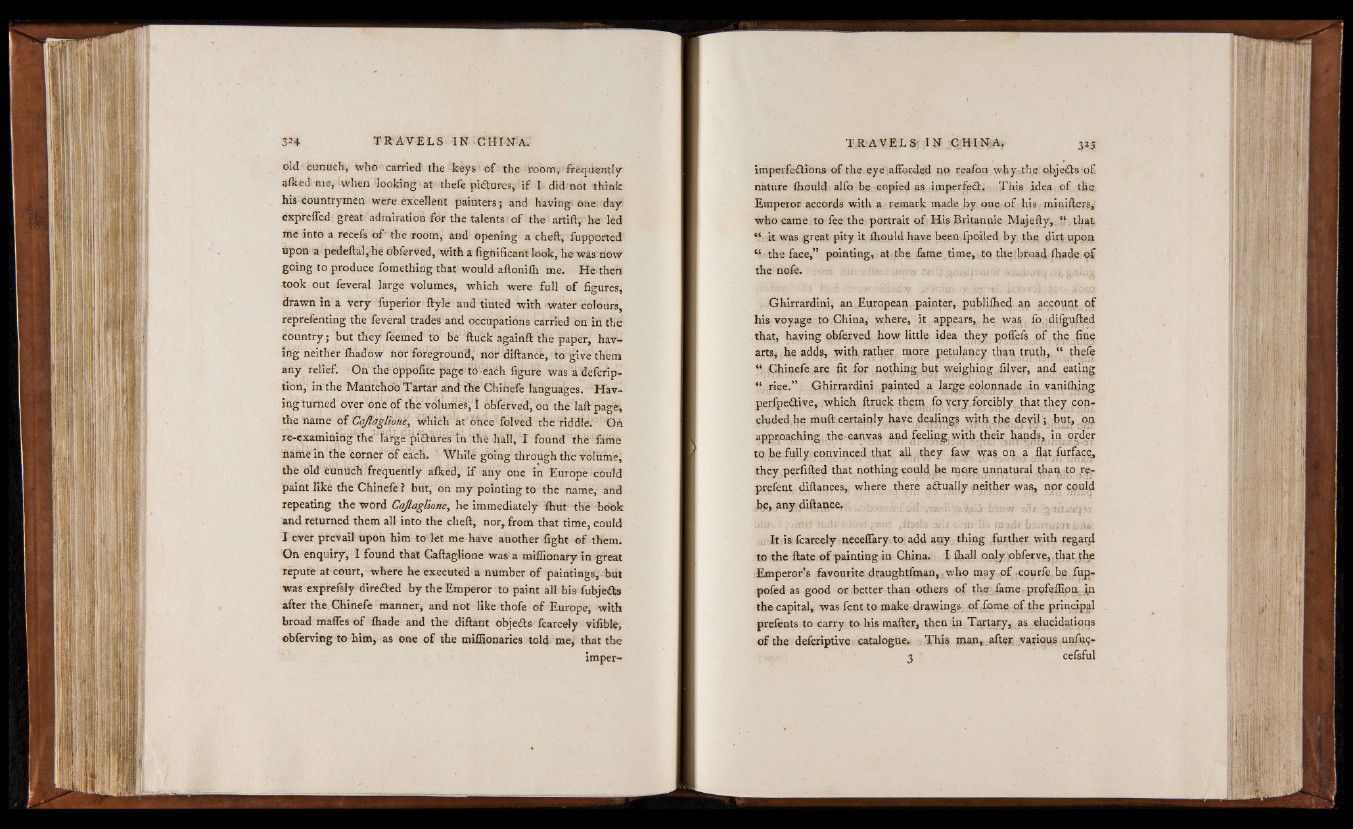
old eunuch, who carried the keys o f the room, frequently
afked- me, when looking - at thefe piftures, i f I did not think
his countrymen were excellent painters ; and having one day
expreffed great admiration for the talents o f the artift, he led
me into a recefs o f' thè room, and opening a cheft, fupported
upon a pedeftal, he obferved, with a fignificant look, he was now
going to produce fomething that would aflonilh me. He then
-took out feveral large volumes, which were full o f figures,
drawn in a very fuperior ftyle and tinted with water colours,
reprefenting the feveral trades and occupations carried on in the
country ; but they feemed to be ftuck againft the paper, having
neither ihadow nor foreground, nor diftancè, to give them
any relief. On the oppofite page to each figure was a defcrip-
tion, in the Mantchoo Tartar and the Chinefe languages. Having
turned over one o f the' volume*1,;Ì obferved, on the 1 aft page,
the name o f Cq/fàgRotòi, which àt'óhce folved the riddle. On
re-examining'the large piébàrès ih thè hall, I found the fame
name in the corner o f each. While ghing through the volume,
the old eunuch frequently aiked, i f any one in Europe could
paint like the Chinefe ? but, on my pointing to the name, and
repeating the word Cajiagitane, he immediately ihut the book
and returned them all into the cheft, nor, from that time, could
I ever prevail upon him to let me have another fight o f them.
On enquiry, I found that Caftaglione was a miffionary in great
repute at court, where he executed a number o f paintings, but
was exprefsly diretfted by the Emperor to paint all his fubjeits
after the. Chinefe manner, and not like thofe o f Europe, with
broad maffes o f ihade and the diftant objects fcarcely vifible,
©bferving to him, as one o f the miffionaries told me, that the
iroperimperfections
o f the eye afforded no reafon why-the obye£ts-of,
nature ihould alfo be copied as imperfect. This idea o f the,
Emperor accords with a remark made by one o f his minifters,
who came to fee the portrait o f His Britannic Majefty, “ that
“ it was great pity it ihould have beeu fpoiled by the dirt upon
M the face,” pointing, at the fame time, to the broad ihade o f
the nofe.
Ghirrardini, an European painter, publiihed an account o f
his voyage to China, where, it appears, he, was fo difgufted
that, having obferved how little idea they poffefs o f the fine
arts, he adds, yvith rather more petulancy than truth, “ thefe
Chinefe are fit for nothing but weighing filyer, and eating
‘ ‘ rice.” ,, Ghirrardini painted, x large colonnade in vaniihing
perfpeCtive, which ftruck thpm fo very, forcibly that they concluded.
he muft certainly fiaye, dealings with the d c y il; but, pi)
approaching the canvas and feeling with their h,ands, in order
to be fu lly convinced that afi they fhvv vyas on a flat furface,
they perfifted that nothing could be more unnatural than to re-
prefent diftances, where there aftually neither -was, npr could
bp, anydiftance.
It is fcarcely neceffary to add a n y , thing further with regard
to the ftate o f painting in China. I ftiall only obferve, that the
Emperor’s favourite draughtfman, . who may o f courfe be fup-
pofed as good or better than others o f the iame prpfeilion fn
the capital, was fent to make drawings o f fame o f jthe principal
prefents to carry to his mafter, then in Tartary, as elucidations
o f the defcriptive catalogue. This map^. after yafieus unfcie-
3 cefsful